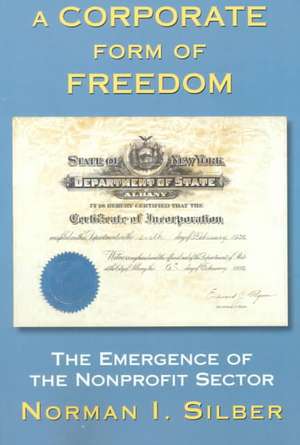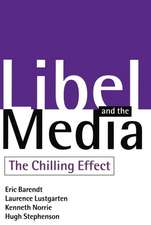A Corporate Form Of Freedom: The Emergence Of The Modern Nonprofit Sector
Autor Norman Silberen Limba Engleză Paperback – 26 ian 2001
| Toate formatele și edițiile | Preț | Express |
|---|---|---|
| Paperback (1) | 363.20 lei 6-8 săpt. | |
| Taylor & Francis – 26 ian 2001 | 363.20 lei 6-8 săpt. | |
| Hardback (1) | 1000.27 lei 6-8 săpt. | |
| Taylor & Francis – 13 iun 2019 | 1000.27 lei 6-8 săpt. |
Preț: 363.20 lei
Nou
Puncte Express: 545
Preț estimativ în valută:
69.52€ • 75.54$ • 58.43£
69.52€ • 75.54$ • 58.43£
Carte tipărită la comandă
Livrare economică 22 aprilie-06 mai
Preluare comenzi: 021 569.72.76
Specificații
ISBN-13: 9780813397627
ISBN-10: 0813397626
Pagini: 200
Ilustrații: black & white illustrations
Dimensiuni: 152 x 229 x 12 mm
Greutate: 0.3 kg
Ediția:New.
Editura: Taylor & Francis
Colecția Routledge
Locul publicării:Oxford, United Kingdom
ISBN-10: 0813397626
Pagini: 200
Ilustrații: black & white illustrations
Dimensiuni: 152 x 229 x 12 mm
Greutate: 0.3 kg
Ediția:New.
Editura: Taylor & Francis
Colecția Routledge
Locul publicării:Oxford, United Kingdom
Cuprins
* Acknowledgments * 1. Introduction * 2. The Development of the Discretionary Model * Advantages to Nonprofit Status * The Divergence of Commercial and Nonprofit Corporate Chartering Practices * 3. Historic Excuses and Uses for Judicial Subjectivity in the Incorporation Process * The Emergence of Doctrinal Justifications for Special Treatment * Applications of the Discretionary Conception by Judicial Progressives * Interwar Characterizations of Permissible Nonprofit Activity * Wartime Applications * Protecting Consensus Values in the Postwar World * 4. The Corrosion of the Discretionary Conception * Student Impudence and the Legitimacy of Judicial Authority * Broadening Corporate Expression in an Interest Group State * Governmental Largesse As an Entitlement * A Roadblock in the Struggle for African-American Civil Rights * The End of Judicial Oversight As a Significant Means for Supervising Nonprofit Corporations * 5. Transition to a New Regime * The Judges Adjust to Their Subordinated Status * The Emergence of Administrative Surrogates for Judges * 6. The New World of Nonprofit Activity * Explosive Growth After the Change * Anemic Disclosure and Administrative Remedies * Misreliance on the Tax Scheme * In Search of a New Direction * Scholarly Assessments * Coda
Descriere
Focusing upon the laws and judicial opinions that have shaped practices in New York and in other states, this work provides an historical account to explain how and why getting a nonprofit corporate charter came to be a matter of right instead of a privilege.










